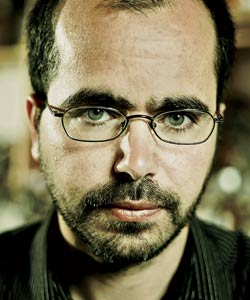 |
When the Iraqi-born, Chicago-based artist Wafaa Bilal debuted his 3-D video game Night of Bush Capturing: A Virtual Jihadi in a public exhibition at Rensselaer Polytechnic Institute in Troy, New York, the show was deemed too controversial and was shut down the same day it opened. Bilal, 41, is trying again, this time in Chicago: His game, in which players can send an avatar on a mission to kill President Bush, is part of an exhibition through August 22nd at Flatfile Galleries (217 N. Carpenter St.; 312-491-1190).
Q: Where did the idea for Virtual Jihadi come from?
A: A computer game that Jesse Petrilla created in 2003 called Quest for Saddam. It’s a first-person shooter game where you encounter Iraqis and you can encounter Saddam and you can kill them. In 2006, al Qaeda released a version of the same game called Night of Bush Capturing. There was a huge outcry because al Qaeda had changed the game so you could hunt Bush instead of Saddam. But you must consider that Quest for Saddam showed innocent Iraqis being shot and there was no outcry. I thought it was hypocrisy.
Q: So you hacked Night of Bush Capturing and inserted an avatar of yourself to go on a suicide mission?
A: That’s correct. But I don’t act on my own. The first-person shooter has to send me on that mission, which is to blow up myself next to Bush. To me, he is a symbol of oppression and aggression in Iraq. That’s why I thought it was appropriate to target him and not U.S. soldiers.
Q: The exhibition generated a lot of controversy when it opened in New York in March; is provocation the only point?
A: Education is also part of the work. The message is to try to bring to the surface what Iraqis are going through. Consider that Iraq has never seen a suicide bomber in its entire history and now it’s happening on a daily basis.
Q: When Virtual Jihadi debuted at Rensselaer, some bloggers and protesters alleged that the game promotes terrorism against America. Would you agree?
A: No, I don’t think that. I’m using a medium to speak about injustice. And I don’t think when an artist speaks out against violence that is the same as promoting violence. There is no way anybody can say I promote violence or support al Qaeda.
Q: Given that Virtual Jihadi closed after one day in New York, what are your expectations for it here in Chicago?
A: I do hope people will give it a chance to see what the game is about. And I also hope that it would not close down.
Q: How has your art changed since your younger brother was killed in the U.S. bombing of the Iraqi city of Kufa in April 2004?
A: The death of [my younger brother] Haji made it very personal. This is the second project where I’ve dealt directly with his death and also the loss of civilians in Iraq. In the past my art was kind of general, and now it’s specific and personal. I think that’s why it has much more weight. Because it’s coming from deep down. That’s when you see the power of art—when it comes from within and reflects the deep struggle.
Q: You moved to the United States in 1992. What was it like to grow up in Iraq under Saddam Hussein?
A: It was living hell because we lived in a state of fear. For me, as an artist, I think I was very much aware that I could end up in jail at any time.
Photograph: Andreas Larsson


